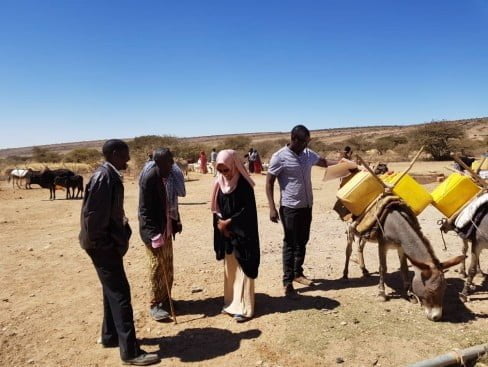Celebrating #WomenHumanitarians from our Membership for World Humanitarian Day 2019

Theme for World Humanitarian Day 2019 is #WomenHumanitarians, supporting the recognition that women deserve in the strengthening of global humanitarian response as well as in protection efforts under international law.
Today we will be celebrating the work of women from our membership who are working to ensure we deliver the greatest choice, dignity and value for people affected by crises. Hear from Amran Ahmed, Humanitarian Programme Manager with CALP member CARE International, who has been instrumental in the delivery of cash alongside other lifesaving assistance in Somaliland.
“My name is Amran Ahmed. I’m a Humanitarian Programme Manager, with CARE International. My role involves managing and leading CARE’s humanitarian operations in Somaliland. As a female humanitarian manager, I give humanitarian response in Somaliland a women’s face. The greatest part of my work goes beyond managing and leading the provision of emergency relief assistance. I also talk to communities about the rights and protection of internally displaced people-making host communities understand what we stand for – as humanitarian aid workers. I also ensure the integration of gender and protection into our programming, building capacities of staff and communities, empowering women, and working with community representatives and government. All that happens, in addition to my daily family responsibility.
In a typical day, my work begins at 6.00am. Calls for assistance begins as soon as I switch on my cell phone and computer. If it’s not a traditional leader, community member, or a local authority representative, then it’s a Government Minister calling in for urgent humanitarian assistance. Or a staff member, seeking my support and guidance, to respond to a crisis immediately.
Seventy-five to eighty percent of populations affected by crisis in Somalia/Somaliland are women and children. I therefore believe that women will be better served, by a female humanitarian aid worker. Having more women in the humanitarian sector leads to a more effective humanitarian response, because they can respond to the needs of the most vulnerable groups such as women and girls. I believe being of a female gender helps a lot of women and girls to voice their needs safely. They find it easy to approach me. I also feel my gender benefits me, when talking to women and girls. It enables me to get a clear understanding of how the crisis affects them.
Humanitarian work is not for the fainted hearted. I do what majority of other women have feared to do. I work in very difficult circumstances. I’m exposed to complex working environments and protracted crisis. In any given year, its either drought, floods, cyclone, conflict or disease outbreak, that I must respond to. Being a young Somali female leader, in a society where men are the natural leaders and where women are less visible, is not easy.
Even with all the challenges stated above, I have passion for humanitarian work, ever since I was a student in the university. I worked as a community volunteer in my home district and sometimes accompanied health workers conducting mass campaigns. I’m passionate about serving people affected by crisis. I believe in giving to others and helping others. There is nothing more important to me than saving lives and contributing to rebuilding the lives of people affected by disasters.
I consider my work as one of the most rewarding careers. I have never regretted having chosen this work. At the end of the day, I feel happy, reaching the most in need. The experience and lessons I have gained through my humanitarian career are invaluable. One never stops learning and discovering in humanitarian work. And that is the biggest factor that keeps me motivated every day.
My message to fellow female humanitarian workers is to develop self-confidence and serve in humanitarian work.”


